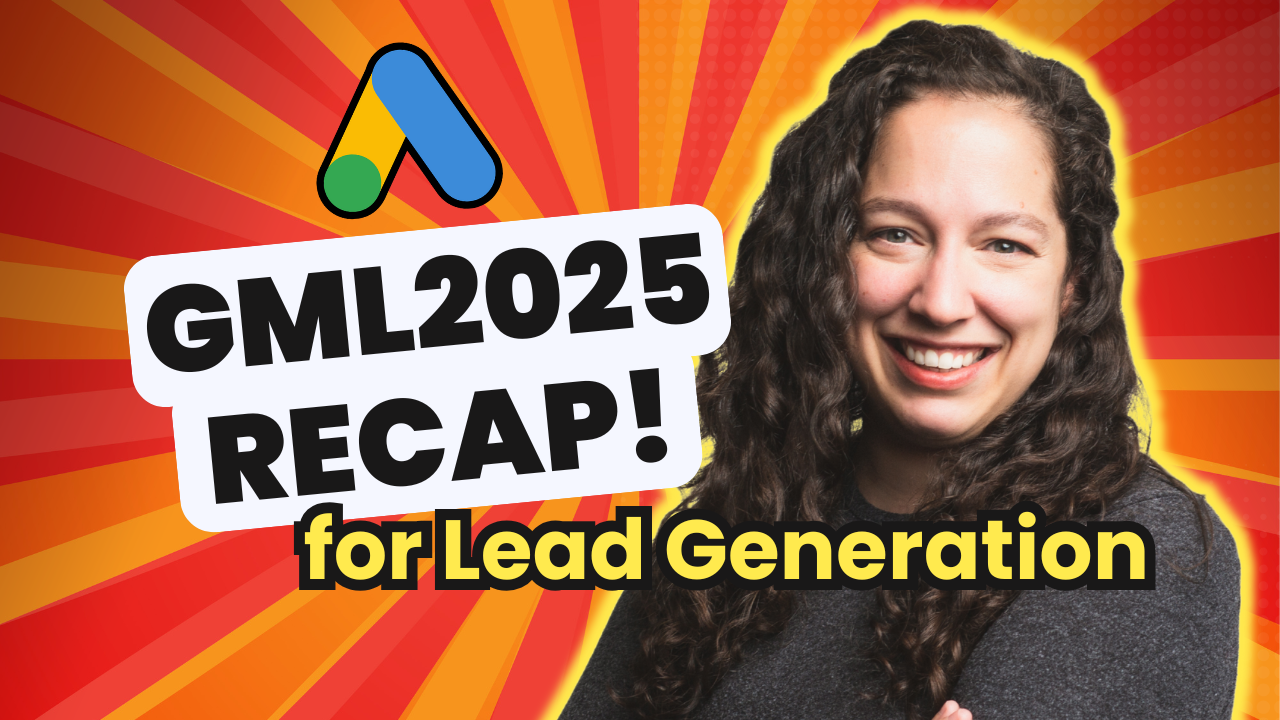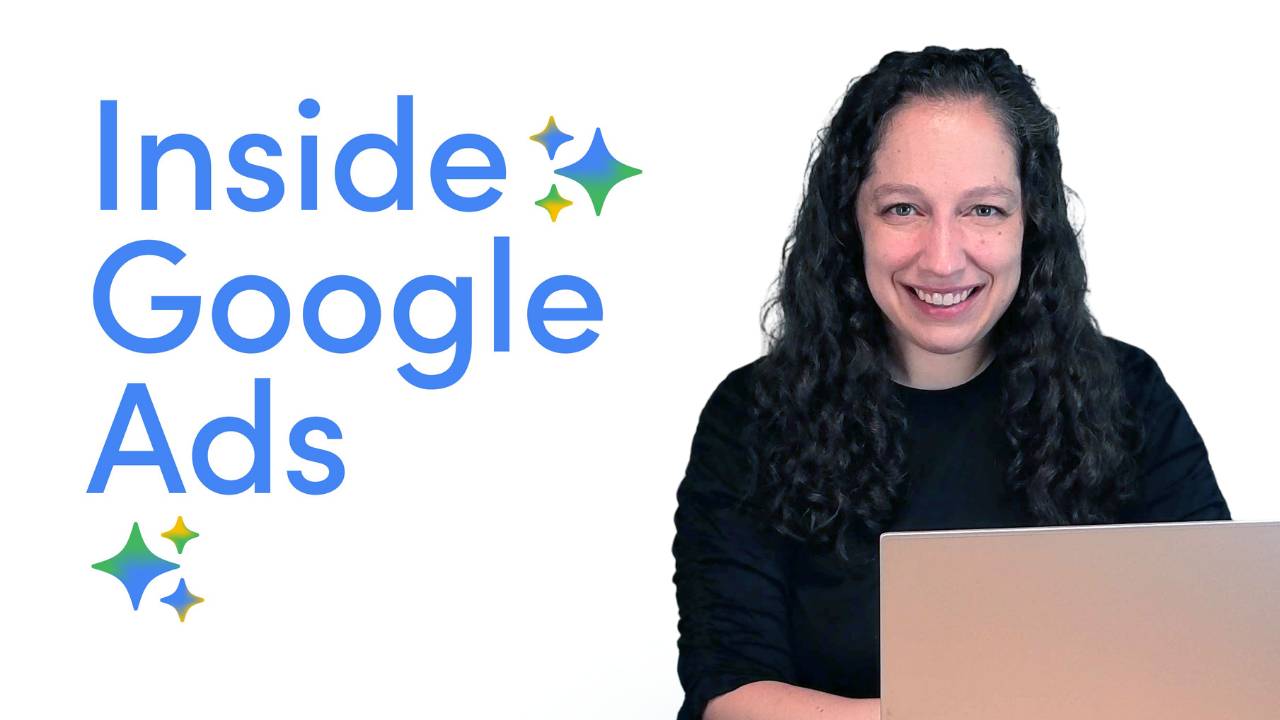Google Marketing Live 2025: Recap for Lead Gen Advertisers
May 21, 2025
By: Jyll Saskin Gales, Google Ads Coach
Effective measurement is often cited as both a significant challenge and a cornerstone for successful Google Ads campaigns for lead generation. Whether it's setting up offline conversion tracking, implementing enhanced conversions, or leveraging value-based bidding, the quality of leads you receive is directly tied to the accurate, full-funnel data you provide to Google.
At Google Marketing Live (GML) 2025, Google addressed this need head-on, alongside other important enhancements. It's true that ecommerce was the brighter shining star, but there were still enough nuggets to get lead gen advertisers excited. I was fortunate to attend GML in-person in Mountain View this year, and I'm excited to bring you these critical updates straight from the source.
Here are 3 key Google Ads product announcements from GML that lead generation advertisers should be aware of for 2025:
1. Increased Transparency in Performance Max
Performance Max Search Term Reporting
Performance Max campaigns have always provided advertisers with limited visibility into the specific search queries driving impressions and clicks. Our insights were confined to "search term categories," offering only a generalized understanding of query types. This lack of transparency was a particular point of friction for many focused on lead quality.
That situation is now evolving. Google is rolling out a full search term report within Performance Max, designed to mirror the comprehensive reports familiar to users of standard Search and Shopping campaigns.
This expanded level of detail empowers lead generation advertisers to gain a clearer understanding of what potential customers are searching for when ads appear, enabling more accurate and effective adjustments to drive higher quality leads.
Self-Serve Negative Keywords in PMax
Complementing the improved search term reporting, Google is also providing advertisers with the capability to manage negative keywords in Performance Max through a self-serve option. Historically, adding negative keywords to these campaigns was a cumbersome process, requiring direct assistance from a Google representative.
Now, you can add up to 10,000 negative keywords per PMax campaign. This allows for proactive exclusion of irrelevant or low-intent searches that might consume budget without generating qualified leads, thereby enhancing campaign efficiency for lead acquisition.
Performance Max Channel Performance Reporting
Until now, lead generation advertisers couldn't precisely determine how their PMax budget was being distributed across channels like Search, Display, Video, etc. While some leveraged scripts to approximate this data, it lacked true precision for optimizing lead delivery across channels.
Now, PMax Channel Reporting offers a more transparent view. This feature is currently in open beta and is slated for global rollout starting May 2025. It provides data on how your impressions, clicks, conversion events (leads), etc. are distributed across Google's various channels.
It's important to note, however, that while Google Ads now offers reporting on these channels within Performance Max, direct channel controls are not provided. This means you cannot deselect or exclude specific channels, even if their individual performance for lead generation isn't meeting your expectations.
2. Smart Bidding Exploration
Google recently introduced Smart Bidding Exploration, a new Smart Bidding feature announced at Google Marketing Live 2025. This tool is designed to assist advertisers in uncovering additional valuable traffic for their Search campaigns without requiring changes to their existing keywords. Smart Bidding Exploration is moving into open beta in May 2025, indicating its imminent global availability across Google Ads accounts.
Google describes this feature as an "AI-powered tool designed to identify new sources of valuable traffic to help you maximize performance for Search campaigns using Smart Bidding." Essentially, it enables Google's Smart Bidding (specifically, Target ROAS, or tROAS) to broaden its scope slightly. Crucially, Smart Bidding Exploration does NOT modify your targeting settings; instead, it achieves this broader reach by subtly adjusting your bidding strategy.
When considering Smart Bidding Exploration for lead generation, it's essential to understand the potential trade-off:
- Potential for More Total Leads/Profit: The primary benefit for lead generation advertisers is the potential to increase overall lead volume and, consequently, your net profit. By allowing Google to explore slightly less "efficient" but higher-volume opportunities, you can potentially capture more prospects.
- Slightly Lower Efficiency (per lead): To achieve this increased overall volume, you may need to accept a slightly lower efficiency per lead generated through this particular feature.
This concept of accepting a dip in ROAS for a gain in overall volume and profit has been a discussion point in the industry for years. Smart Bidding Exploration now provides a built-in feature within Google Ads to directly test this theory in your lead generation campaigns that are leveraging value-based bidding.
3. Improved Measurement Tools
For lead generation advertisers, robust measurement is not just important - it's foundational. So much of campaign success hinges on providing Google with accurate, comprehensive full-funnel data, which in turn allows the system to deliver high-quality leads.
When discussing the future of measurement at GML, Google emphasized three key enhancements: Confidential Matching, the Data Manager API, and Incrementality Testing.
Confidential Matching
Confidential Matching is a feature within Google Ads Data Manager. It enables you to securely utilize your first-party data for matching purposes through confidential computing.
First introduced in September 2024, this feature offers a more secure method for sharing personally identifiable information (PII) about your customers with Google Ads. It leverages advanced security measures such as a Trusted Execution Environment (TEE), along with optional encryption support and attestation.
This is an enabled-by-default feature and comes at no extra cost to advertisers. As a lead generation advertiser, no direct action is required on your part to benefit from it. If you use your data with Customer Match via a "Direct connection" in Google Ads Data Manager or Audience manager, your data will be processed using confidential matching automatically, enhancing privacy for your valuable lead data.
Data Manager API
The Data Manager API simplifies the process of sending audience and conversion data to various Google advertising products through a single integration point. This API also supports advanced features like confidential matching and encryption, providing a more robust and privacy-conscious method for data sharing. Essentially, it's designed to make the crucial task of sharing your customer data with Google Ads more streamlined, durable, and privacy-safe, which is paramount for accurately tracking and optimizing your lead generation efforts.
While GML touched on incrementality testing, too, these other features offer lead generation advertisers more secure and efficient ways to feed essential customer data back to Google, which is crucial for improving targeting and optimizing for higher quality leads in an increasingly privacy-focused environment.
More GML Announcements for Lead Gen Advertisers
While the updates above form my top three most impactful announcements for lead generation advertisers, you might encounter other discussions in the industry, particularly concerning AI Max for Search campaigns. This feature was actually announced a few weeks prior to GML and is slated for global rollout to Google Ads accounts starting in May 2025.
Think of AI Max as a Search-only version of Performance Max, designed to bring keyword-less search term matching, text asset customization, and final URL expansion into your existing Search campaigns.
It's important to note that AI Max is not a new campaign type; instead, it's an optional setting that can be activated within your current Search campaigns and will operate alongside your existing keywords, dynamic ad targets, and ad creative. Personally, I don't see much utility here for lead generation advertisers, especially if you're working with a small budget. But only time will tell if this shiny new toy becomes popular...
More updates from Google Marketing Live 2025
Google Marketing Live 2025: Recap for Small Business Owners
Google Marketing Live 2025: Recap for Lead Gen Advertisers
Google Marketing Live 2025: Recap for Ecommerce Businesses
AI Max for Search Campaigns: What you need to know about "Search Max"
Smart Bidding Exploration in Google Ads: Everything you need to know
Performance Max Channel Reporting: Transparency, But No Control
Performance Max Search Terms Report & Negative Keywords - Finally!
All About Shoppable YouTube Ads: Shoppable Masthead, Shoppable CTV
What are Attributed Brand Searches in Google Ads?
Free Google Ads newsletter
Join 8,000+ business owners and marketers discovering my secrets to Google Ads success. Subscribe now for proven tactics in your inbox every other Tuesday.


